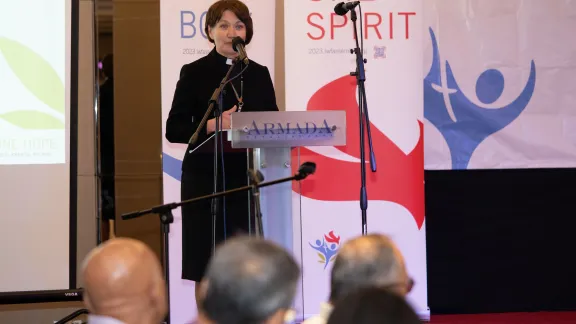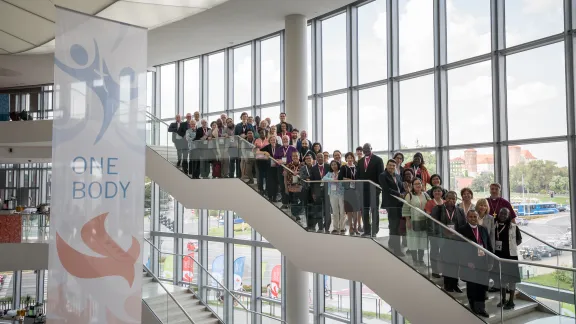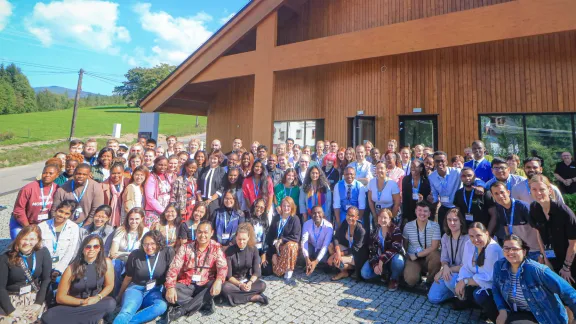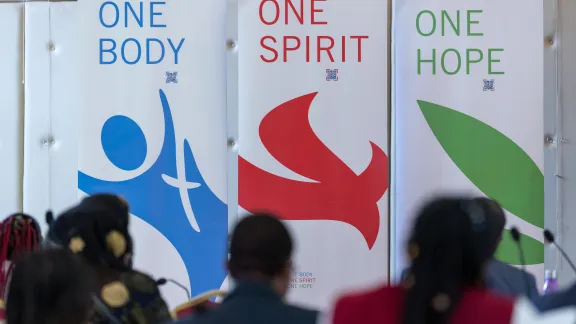Asia: Wounded bodies and signs of hope
At the Asia Pre-Assembly, the LWF General Secretary presented the theme of the upcoming Thirteenth Assembly, highlighting its relevance in the region.

General Secretary of the LWF, Rev. Dr. Anne Burghardt, presenting the Assembly theme during the Asia Pre-Assembly. Photo: LWF/Jotham Lee
General Secretary reflects on the 'One Body, One Spirit, One Hope’ at Asia Pre-Assembly
(LWI) - The root of all systems of oppression, division, exclusion and dehumanization lies in a fundamental refusal to see, trust and respect the image of God in a fellow being whose body is different, said The Lutheran World Federation (LWF) General Secretary Rev. Dr. Anne Burghardt. She presented the Assembly theme “One Body, One Spirit, One Hope” at the Asia Pre-Assembly in Kuala Lumpur, Malaysia.
“In the context of the Assembly, the concept of ‘one body’ conveys many layers of meaning. At the ecclesial level, it refers to being the one Body of Christ through baptism, Burghardt said. This body should have “no distinctions according to culture, ethnicity, gender, citizenship or economic status."
Yet, there are many wounded bodies in the world, she added. At the Assembly we will visit the the memorial and museum of Auschwitz-Birkenau, a former concentration and extermination camp. As we gather there, we will also remember genocides and crimes against humanity in other places in the world, including “those who died or suffered during the Cambodian genocide in the early 1970s.” Nearly 2 million Cambodians, or a third of the population, died at the hands of the Communists led by Pol Pot “simply because the government wanted uniformity and refused to accept those who thought or lived differently.”
“When human bodies are classified according to caste, color, religion, culture, ethnicity or gender, they can be dismissed, even dis-membered because they are not compliant with the idea of dominant ‘normal’.” That led to humans no longer seeing one another as siblings created in God’s image.
Referring to the colonization of Asian countries in the 16th century, many countries, including Indonesia, India and Malaysia, were ruled by foreign powers for centuries. “Peoples who have gone through such experiences know what it means to be treated differently because of their ethnicity, race, class or religion,” Burghardt said. “It is essential to learn from history.”
One of our age’s most destabilizing and socially divisive collective spirits “is a resurging ethno-nationalism,” she said. “Ethno-nationalists often politicize religion or belief as grounds for instituting oppressive or exclusionary forms of legal discrimination. Religion is utilized to achieve worldly ends.”
Under such circumstances, religion “becomes static, giving rise to religious fundamentalism” that “fuels powerful tides of ethno-nationalism worldwide”. Distinguishing between misleading theologies and a theology based on the message of justification “is a core task of the whole church,” the General Secretary said.
Signs of hope
The General Secretary also highlighted several signs of hope in the global communion and the Asia region.
When it comes to the full inclusion of women in the ordained ministry, there has been much progress. “ Earlier this year the communion celebrated “the first ordination of a woman pastor in the Evangelical Lutheran Church in Jordan and the Holy Land.” Rev. Selma Chen was also elected president of the Lutheran Church of Taiwan. Currently, she is the only woman church leader in the Asia region. In India, the United Evangelical Lutheran Churches in India (UELCI) celebrated the 30th anniversary of women’s ordination in 2022. In addition to this, the communion rejoiced the ordination of the first women pastors in the host church of the Assembly, the Evangelical Church of Augsburg Confession in Poland, in 2022. “The gospel always remains true, regardless of the gender of the person who proclaims it,” Burghardt underlined.
In Asia, “we also have good examples of cooperation between our local member church and the World Service country program.” One example is the good collaboration between the LWF Jerusalem program and the Evangelical Lutheran Church in Jordan and the Holy Land, as well as to the strong collaboration between the LWF member churches and LWF World Service country programs in Myanmar and Nepal. She referred to the LWF’s guidance note on the “Joint Engagement of World Service Programs and Member Churches” published in 2021. “It is also encouraging to know that our member churches in Asia are actively serving their communities themselves,” Burghardt said, adding that during the COVID-19 pandemic “the LWF Communion Office partnered with many of our member churches in Asia, offering aid to those impacted by the COVID-19 pandemic.”
Peace is a central calling of the LWF and its member churches, said the LWF general secretary. And “although the work for peace, hope and reconciliation is not ours to complete, we don’t have liberty to give it up. The LWF and member churches have always worked and must continue to bring in word and deed a message of hope.”
One more sign of hope is the continued growth of the global communion. At its last Council meeting, the LWF approved membership applications from two churches in Asia, the Lutheran Church in Cambodia and the Geraja Niha Keriso Protestant Church in Indonesia for the first time, welcoming both churches to get to know better the LWF through participation in LWF activities, programs and meetings before receiving them into full membership after two years.
The Asia Pre-Assembly takes place in Kuala Lumpur, Malaysia, from 14-18 June 2023. The Thirteenth Assembly of the Lutheran World Federation takes place 13-19 September 2023 in Krakow, Poland. The theme of the Assembly will be “One Body, One Spirit, One Hope”. It will be hosted by the Evangelical Church of the Augsburg Confession in Poland.
LWF/A. Weyermüller


